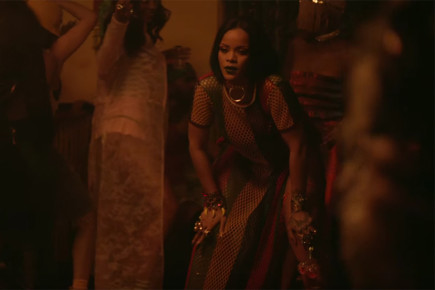Part one of Rihanna’s seven-and-a-half-minute double video for the hit single, “Work”, puts Caribbean dancehall culture on worldwide display and paints a picture of how strong it is reflected in Toronto.
Produced by Boi-1da, written by PartyNextDoor and featuring Drake, the track and video – complete with dancehall vibes and patois – quickly went viral.
But not all the feedback was positive. The song sparked a meme to express how some music fans were having difficulty understanding what she was saying outside of “work, work, work, work, work, work.”
The meme ignorantly suggests that the patois in the lyrics are ‘gibberish’ and some have taken to social media to bash Rihanna for making a song that appeals to her Barbadian roots more than her recent work. Tweets like, “I wonder how much Rihanna got paid to mumble gibberish in #WORK,” are just one of many.
Beyond the lyrics, the video too received some heavy criticism.
The first part of the video, made by Director X, was filmed in Toronto at Caribbean restaurant, The Real Jerk. The visuals are reminiscent of those used in Sean Paul’s “Get Busy” and Rihanna’s debut single, “Pon de Replay”, videos also done by the Canadian director.
Some called the dancing “raunchy” and “overly sexual”, but those who know the culture well, say that’s just how Caribbean people do it.
“… That’s the way we dance, it’s part of our culture. It’s not that we’re trying to be overly sexual, it’s just the way we dance,” says owner of The Real Jerk, Edward Pottinger. “They weren’t doing anything different from a club in the Caribbean.”
“It’s been the case for 500 years, the way that the Caribbean gets framed, first of all by colonizers, and in more contemporary time by tourists.”
Camille Hernandez-Ramdwar, who is an associate professor of Caribbean studies at Ryerson University in Toronto, says the video reminded her of her Trinidadian roots.
“I could smell the place, feel the heat and the sweat and everything. It was a good vibe, it was a set of people that came to have a good time and get on,” says Hernandez-Ramdwar.
She adds that one of the things that stood out to her the most was the fact that the video featured women of all sizes. “One of the greatest things for me in that video is the big women because you don’t see that and … they weren’t hidden in the back; they were very visible.”
According to the professor, the reason people view certain parts of the dancehall culture as overly sexual is a result of how the Caribbean has been historically presented to the rest of the world.
“It’s been the case for 500 years, the way that the Caribbean gets framed, first of all by colonizers, and in more contemporary time by tourists,” she explains. “… The Caribbean is marketed as a tourist destination and is seen as a site of pleasure as a commodity that can be bought. So you can go there, you can buy sex, you can buy weed, you can buy liquor.”
Hernandez-Ramdwar says it is the second part of the video, where Rihanna’s shirt is see-through, that she sees as more explicit and problematic for broadcasting purposes.
“I feel like we Jamaicans influence a lot so it’s like even down to the slang, even the pop songs these days.”
Canadian YouTuber and actor Marlon Palmer, more popularly known as ThatDudeMcFly, was in the video and describes it as Hernandez-Ramdwar saw it: a “24-hour dance party.”
“Everyone had fun on set; it was just straight dancing from like 10 a.m. until 6 a.m. the next day,” says Palmer.
He adds that “Work” is just one of several songs right now that has a dancehall or Caribbean vibe to it, citing Justin Bieber’s “Sorry” as a widely successful example.
“I’ve always believed that Jamaica has a hand in everything that happens in the world. I feel like we Jamaicans influence a lot so it’s like even down to the slang, even the pop songs these days, a lot of pop songs have this dancehall influenced theme to them,” says Palmer.
The “Work” music video acted as a glimpse into the Caribbean culture and has opened up the door for people to actually learn more about it, something that means more to Pottinger than any new business the video may generate for The Real Jerk.
“I want to represent the Caribbean as positive as possible,” he says. “A lot of the news that comes in about Jamaica, Trinidad or wherever, isn’t always positive … there’s a stigma around us … Drake and Rihanna showed the world a part of the culture, I wouldn’t say all of our culture because we don’t all do dancehall, [but] we don’t all do Bob Marley [either]. We’re showing people that we have a lot to offer.”
Image is a screen shot from the “Work” music video.




Comments are closed.